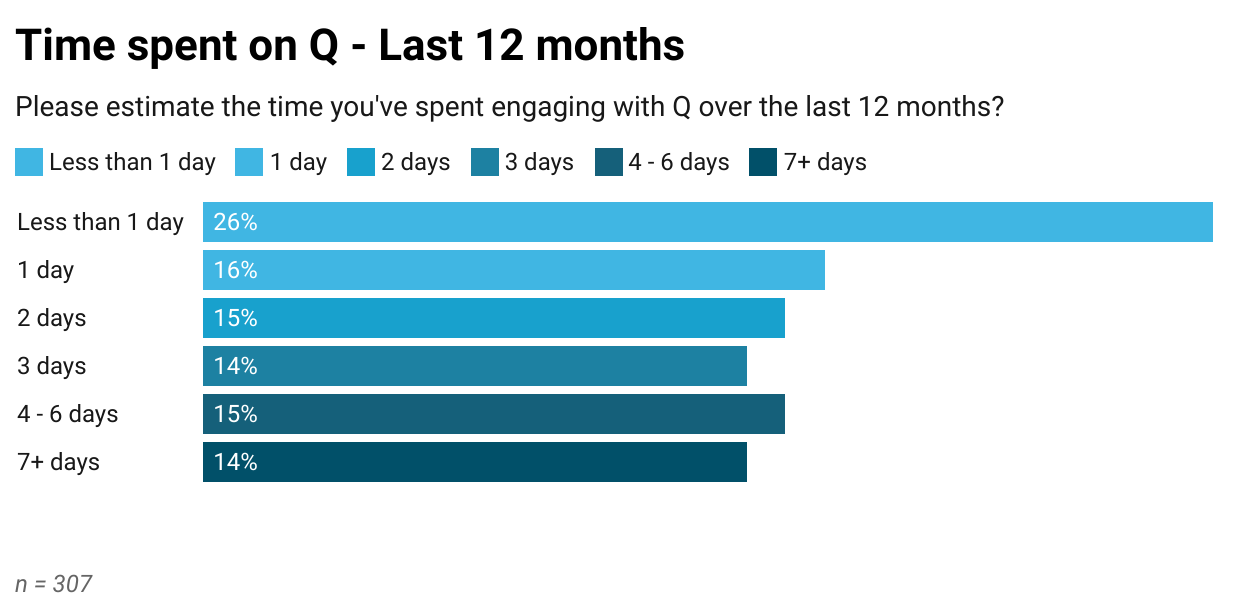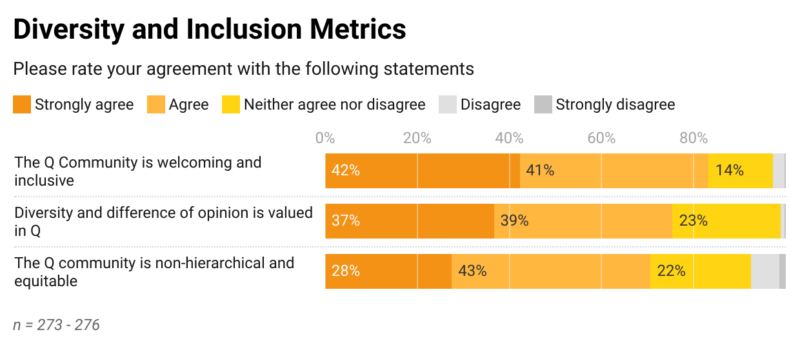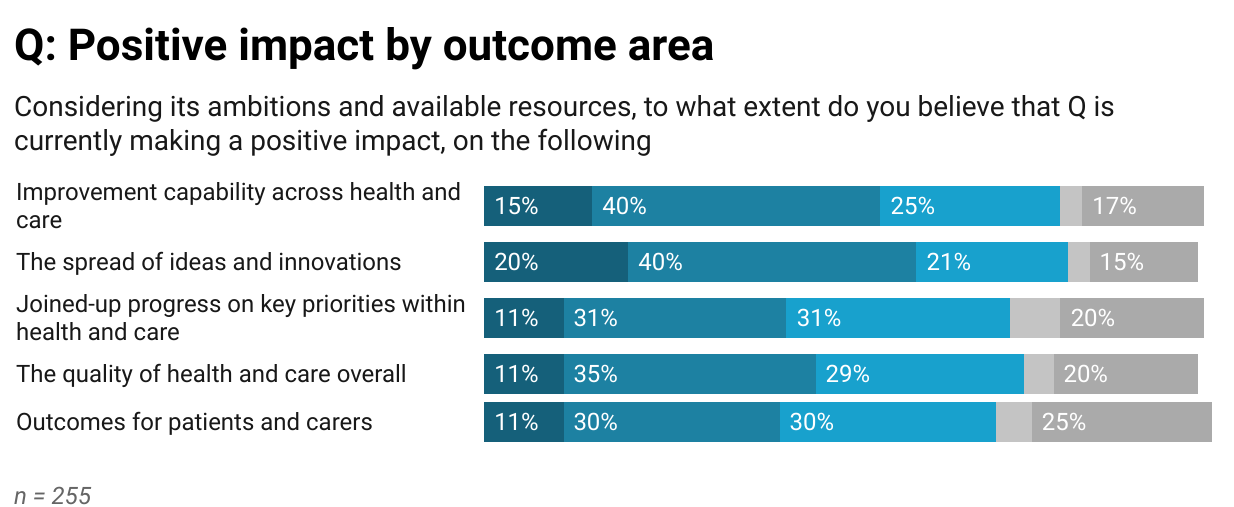350 Q members responded to our member survey: thank you! The survey, along with our other evaluation work, has informed our plans for this year and beyond. This blog shares highlights from the data and our response so far and in a few places, we ask you to help us interpret the findings. Powerful data often prompts more questions! Next month, we’ll provide more details on our plans for the coming year.
Engagement across the community

Q is designed to offer both light touch and more in-depth opportunities. The survey results showed a range of engagement levels. Two-fifths (42%) of members spent a day or less on Q in the last year, and a smaller group (14%) spent seven days or more.
Our research shows that highly engaged members are more likely to take on leadership roles that support others. We want to encourage and support these members, as they are central to building a vibrant and impactful Q community for all. We are currently developing a participation strategy that will support and grow the number of highly engaged members.
Q’s community culture

Members often tell us how important the ‘feel’ of Q is in attracting a wide range of people. Most respondents agreed that Q is welcoming, inclusive and values diversity and difference. The figures for the community being seen as non-hierarchical and equitable are lower. Some survey comments suggested this is because of perceived elitism around improvement expertise in our application process. Our analysis didn’t reveal significant differences in experience based on equality characteristics. Equity, diversity and inclusion remains a long-term priority for Q, with this survey helping inform an increased focus over the years ahead. We’ll continue to involve members and share updates as we go.
Offers and groups
The survey showed that members highly rate the quality of Q’s offers. They were also considered useful in supporting their learning and improvement work. Informal connections or conversations with other members, attending local or regional events and using materials and resources such as the skills for collaborative change toolkit, were rated highly. Randomised Coffee Trials (RCTs) and participating in a group (including special interest groups) were rated less positively. We are reviewing the experience of RCTs and have recently completed a pilot funding offer for groups to help boost this important part of Q.
Benefits of being a Q member
Survey respondents rated their individual learning and development benefits more highly than benefits gained through networking and connecting. For example, the learning and development benefit gaining insights/ examples relevant to their work attracted the highest rating (62% benefitted to a great or moderate extent)
Of the connecting benefits members report, a sense of belonging within the Q community was rated the highest (49% benefitted to a great or moderate extent) with developing useful new connections within Q rated lower (39%). We don’t have any comparable data but this is lower than we would hope for. It’s possible this is due to the constraints members have faced during the pandemic. Has your pattern and focus of networking changed during COVID? This benefit is fundamental to Q’s theory of impact, and what we know members look for from Q. Making sure members can make helpful connections will be a focus for our work next year. We’re developing our digital infrastructure and working on enabling community participation and supporting groups.
Impact on members’ improvement work
Overall, two-fifths (40%) of respondents said that Q had enabled them to undertake more effective and sustainable improvement (to a great or moderate extent). Many examples were provided in the free text question although the majority were related to personal benefits rather than concrete impact on their work. Funding is clearly an important factor in supporting this type of impact with three-fifths (58%) of those who had received funding saying that Q has enabled them to undertake more effective and sustainable improvement. We need to enable the engagement within Q to translate to impact on members’ improvement work at a scale in line with the ambitions set out in our 10-year strategy.
Impact at system level

Almost half (46%) thought Q was making a positive impact to a great or moderate extent on the quality of health and care overall. More than half (52%) thought that Q was increasing the visibility, credibility, and profile of improvement at the national level to a great or moderate extent (although ratings were lower when asked about impact at regional levels or within their organisation).
Improvements and future priorities for Q
The top three member priorities for Q were to increase sharing of practical tools and approaches to improvement (48%), increase opportunities to bring fresh approaches to complex shared challenges (48%), and increase support to members to build improvement capability in their organisation (45%). Many respondents also mentioned that they are looking to the community to support them with system priorities including recovery, co-production and patient involvement and collaboration across boundaries over the next 12 months. We are committed to supporting members to play their full role in areas that are priorities for them, and the system as a whole, over the coming years.
The survey has provided some positive findings about the high-quality offers and inclusiveness of Q, the benefits for members and how this is perceived to achieve impact at the system level. However, respondents also provided more challenging feedback on some areas including our groups and how we work with members to achieve tangible impact on improvement work and practice. As one survey respondent told us:
“Q needs to have immediacy and relevance to very busy day jobs. It’s a tough bar. How can Q help people deliver better results faster. Not marginal to the work, but as “the work” and so how can improvers prove themselves significant at a time of extreme pressure for NHS and the UK.”
Just as Q members have big plans, in Q we have set ourselves some big ambitions for supporting learning and improvement at scale. This survey is an important way member experience and insight informs our work and will help us achieve stronger support and impact as a community. We welcome any reflections on the statistics highlighted here.